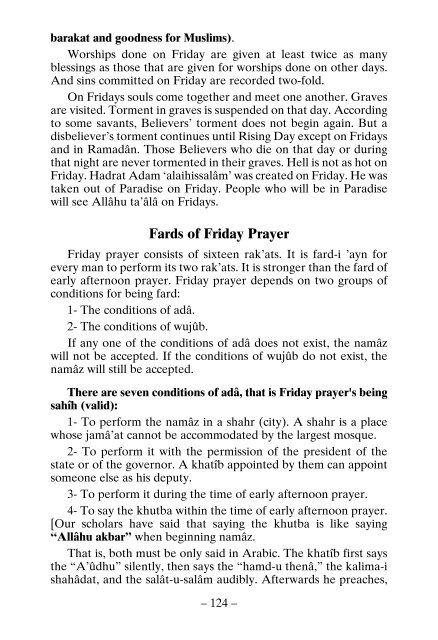Book of Namaz
Create successful ePaper yourself
Turn your PDF publications into a flip-book with our unique Google optimized e-Paper software.
arakat and goodness for Muslims).<br />
Worships done on Friday are given at least twice as many<br />
blessings as those that are given for worships done on other days.<br />
And sins committed on Friday are recorded two-fold.<br />
On Fridays souls come together and meet one another. Graves<br />
are visited. Torment in graves is suspended on that day. According<br />
to some savants, Believers’ torment does not begin again. But a<br />
disbeliever’s torment continues until Rising Day except on Fridays<br />
and in Ramadân. Those Believers who die on that day or during<br />
that night are never tormented in their graves. Hell is not as hot on<br />
Friday. Hadrat Adam ‘alaihissalâm’ was created on Friday. He was<br />
taken out <strong>of</strong> Paradise on Friday. People who will be in Paradise<br />
will see Allâhu ta’âlâ on Fridays.<br />
Fards <strong>of</strong> Friday Prayer<br />
Friday prayer consists <strong>of</strong> sixteen rak’ats. It is fard-i ’ayn for<br />
every man to perform its two rak’ats. It is stronger than the fard <strong>of</strong><br />
early afternoon prayer. Friday prayer depends on two groups <strong>of</strong><br />
conditions for being fard:<br />
1- The conditions <strong>of</strong> adâ.<br />
2- The conditions <strong>of</strong> wujûb.<br />
If any one <strong>of</strong> the conditions <strong>of</strong> adâ does not exist, the namâz<br />
will not be accepted. If the conditions <strong>of</strong> wujûb do not exist, the<br />
namâz will still be accepted.<br />
There are seven conditions <strong>of</strong> adâ, that is Friday prayer's being<br />
sahîh (valid):<br />
1- To perform the namâz in a shahr (city). A shahr is a place<br />
whose jamâ’at cannot be accommodated by the largest mosque.<br />
2- To perform it with the permission <strong>of</strong> the president <strong>of</strong> the<br />
state or <strong>of</strong> the governor. A khatîb appointed by them can appoint<br />
someone else as his deputy.<br />
3- To perform it during the time <strong>of</strong> early afternoon prayer.<br />
4- To say the khutba within the time <strong>of</strong> early afternoon prayer.<br />
[Our scholars have said that saying the khutba is like saying<br />
“Allâhu akbar” when beginning namâz.<br />
That is, both must be only said in Arabic. The khatîb first says<br />
the “A’ûdhu” silently, then says the “hamd-u thenâ,” the kalima-i<br />
shahâdat, and the salât-u-salâm audibly. Afterwards he preaches,<br />
– 124 –

















